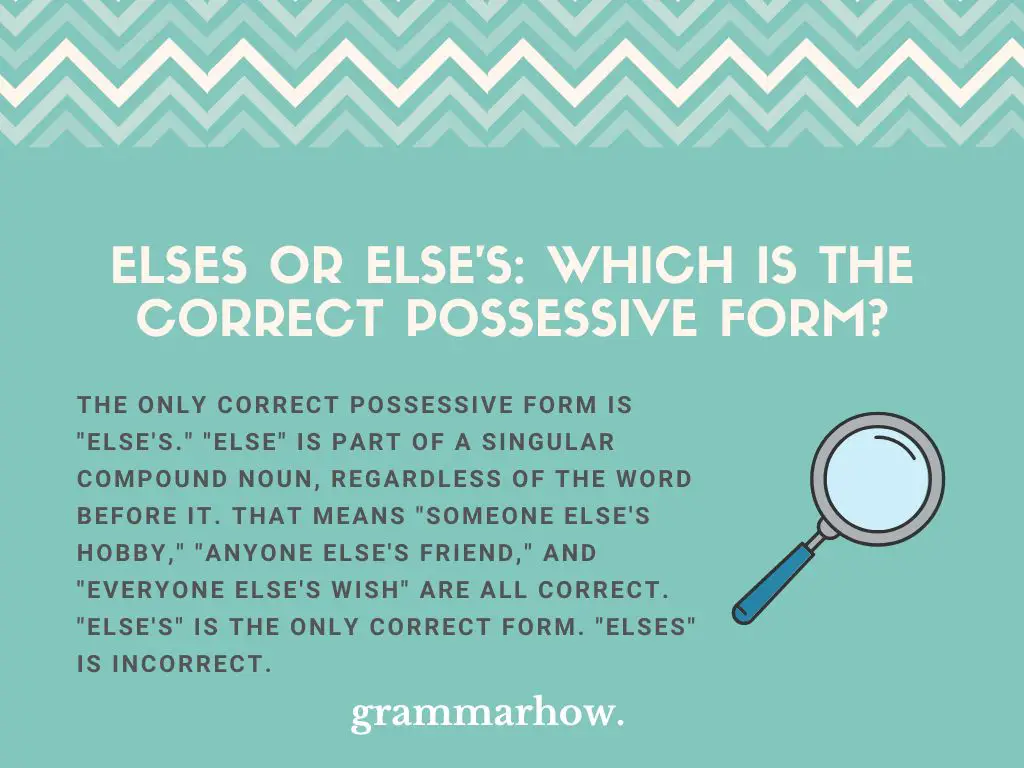“Else” is a word that appears in plenty of areas in written and spoken English. You could say “anyone else,” “everyone else,” or “someone else” (amongst other variations). This article will look at the correct possessive forms you can use when demonstrating ownership.
Elses or Else’s: Which Is the Correct Possessive Form?
The only correct possessive form is “else’s.” “Else” is part of a singular compound noun, regardless of the word before it. That means “someone else’s hobby,” “anyone else’s friend,” and “everyone else’s wish” are all correct. “Else’s” is the only correct form. “Elses” is incorrect.

There is no plural form of “else.” As such, you are left with the following when using the possessive form:
- That is someone else’s dog. I don’t think you should be taking it.
- Everyone else’s ideas were better than mine. I don’t know how I’m going to compete!
“Someone else” refers to one unidentifiable person. This is fairly easy to use, as “else” is already in the singular form.
“Everyone else” makes things difficult. “Everyone” refers to multiple people. So, expecting “else” to have a plural form after it is reasonable. However, “everyone else” is a singular compound noun.
Even when referring to multiple people, “else’s” is still the only correct possessive form.
There are no grammatical situations where “elses” works. You cannot add a simple “s” to the end of “else” and expect it to be a plural form.
Elses
“Elses” is wrong. Some think it can work as the plural form of “else,” but there is no plural form of “else.”
“Else” is a singular term. You can include it after nouns to talk about an unidentifiable person or people.
Common terms include “someone else” and “anyone else.” Regardless of the word before “else,” there is never a time when “elses” should be used.
Common plural rules teach us that “s” can come after regular nouns to create multiple instances of the same object. However, this does not apply to “else,” as there can only be one instance of “else.”
Else’s
“Else’s” is the correct possessive form. It is officially known as the singular possessive form because it gives possession to singular compound nouns like “someone else’s” or “everyone else’s.”
You may use this form whenever an object is owned by the compound noun associated with “else’s.” For example:
- Someone else’s keycard was used to open this door.
- Everyone else’s plans worked better than mine. I’m gutted.
- Does anyone else’s dog do stuff like this? Mine doesn’t seem to work properly!
Here, “else’s” comes directly before an owned noun. This shows that “else” can own a specified noun in a sentence when an apostrophe and “s” comes after it.
The noun can sometimes come before “else’s,” like so:
- The house is someone else’s. Jack doesn’t live here.
- This idea wasn’t anybody else’s. I came up with it.
Elses’
“Elses'” is another incorrect form as it combines the possessive form with the already-incorrect plural form.
“Elses'” would only work if “elses” was the correct plural form. The apostrophe after the plural form shows this is a plural possessive form. This form would only apply if multiple instances of “else” owned the same object.
You can’t use multiple instances of “else” as it is a singular noun. Therefore, you cannot use the plural possessive form because it does not exist.
What to Remember
When using “else,” you should only write “else’s” as the possessive form.
“Else” is a singular noun used in singular compound nouns to refer to unidentified people. You should only write “else’s” when ownership is presented.
“Elses” and “elses'” are incorrect forms. There is no plural form of “else.”

Martin holds a Master’s degree in Finance and International Business. He has six years of experience in professional communication with clients, executives, and colleagues. Furthermore, he has teaching experience from Aarhus University. Martin has been featured as an expert in communication and teaching on Forbes and Shopify. Read more about Martin here.
